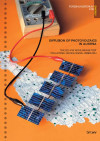Suchergebnisse
Feasibility study of innovative absorption heat pump processes
A feasibility study of innovative absorption heat pump processes for strategic orientation and further development of heat pumping technology and its applications.
IEA PVPS Task 12: Photovoltaics (PV) Sustainability Activities (working period 2024 - 2027)
Photovoltaics (PV) is a renewable energy source that is an important technology for the energy transition. For this reason, or rather despite this, it is important to consider sustainability aspects in PV as well. End-of-life solutions in particular play an important role, as a strong increase in the number of end-of-life modules is expected in the coming years. Well-functioning recycling methods, repair possibilities or reuse options are of great importance. In this project, these existing methods and capacities in Austria are being researched and published in reports and workshops.
MODESTORE - Modular High Energy Density Sorption Heat Storage

Seasonal storage of solar heat for use in low energy and passive houses (new buildings as well as old buildings).
Innovative Concepts for Pumped Storage in Liberalized Grids
In liberalized grids the requirements for pumped storage equipment rise dramatically. The development of a controllable pump turbine to help stabilize the grid is one of the possible solutions to this problem.
Diffusion Of Photovoltaics In Austria

The 200 KW Wide- Range Test Collateral Sociological Research
Forschungsforum
2/1998
Herausgeber: BMVIT
Englisch, 6 Seiten
Downloads zur Publikation
Energy Efficient University Buildings

Potentials, measures and perspectives at Austrian universities
Forschungsforum
3/1999
Herausgeber: BMVIT
Englisch, 6 Seiten
Downloads zur Publikation
Feed-in and system integration of biogas in existing gas grids
Method for assessment of technological aspects of biogas supply to existing gas grids. Definition of characteristic numbers for quantitative an qualitative analysis. Aspects of systems integration.
Upgrading of biogas for the gas distribution system of Salzburg
Development of a cost-effective cleaning unit, free of waste-products, for the upgrading of biogas to natural gas quality. Elaboration of the basis for a demonstration project injecting biogas into the gas distribution system of Salzburg.
Integration methods for solar heat into industrial production processes
The project aims at the development of integration methods for solar heat into industrial production process with batch operations as typical for SMEs
aspern Vienna´s Urban Lakeside - subproject 3a: Technology Centre aspern IQ
The demonstration project "Technology centre aspern IQ" showed that the energy required for space conditioning (heating, cooling, ventilation, lighting, hot water) can be covered from domestic energy production.
Sustainable energy supply: Production and import of biomass and bio fuels
The project gives an overview of the supply and demand for biofuels specifically dealing with the situation in Europe and that in threshold and developing countries using case studies as examples. Cases: Sweden and France as importing countries in the EU, and Senegal as a (potential) exporting nation.
Local Biomass Heating Systems And Solar Energy In Austria

Models for the successful diffusion of new technologies
Forschungsforum
2/1996
Herausgeber: BMVIT
Englisch, 6 Seiten
Investigation of Industrial Processes (IEA- Solar Heating and Cooling Program, Task 33)
The central aim of this international research cooperation is to make industrial processes accessible for solar thermal plants. To achieve this aim basic information is elaborated and components as well as system engineering concepts are developed. Furthermore the intention of Task 33/IV is to survey a detail state of the art in the field of solar process heat that has a validity for Europe. The work of JOANNEUM RESEARCH - Institute of Sustainable Techniques and Systems focuses mainly on the contents of Subtask B.
Production of bioethanol in addition with heat, power and valuable byproducts
The production of bioethanol in Bruck/Leitha in addition to the production of heat, power and valuable by-products from biomass will be optimized by a new process simulation tool under the target of maximum usage of waste and low temperature heat and optimal source and product usage.
Development of thermal solar systems with unproblematic stagnation behaviour
Research on the influence of collector hydraulics, piping and the arrangement of plant components on the stagnation behaviour of thermal solar systems.
IEA Bioenergy Task 37: Energy from Biogas and Landfill Gas (Working Period 2010 - 2012)
Key issues for realisation and dissemination of extraction of biogas from byproducts, waste and bioenergy crops were modulated by international experts.
IEA Bioenergy Task 33: Thermal Gasification of Biomass (Working Period 2010 - 2012)
Obtaining, processing and dissemination of information about international development in the field of thermal gasification of biomass as well as leadership of several key aspects of the task.
IEA Bioenergy Task 40: Sustainable International Bioenergy Trade - Securing Supply and Demand (Working Period 2010 - 2012)
Relevant international trade currents of biomass for Austria as well as frame conditions for sustainable use of biomass have been analysed and documented. One of the key issues was to analyse certification procedures for sustainable bioenergy products.
Hydrogen from renewables in Austria - an energy carrier of the future?
Renewable hydrogen in Austria: Future perspectives for the production and use of hydrogen from renewable energy in Austria with the identification of projects to demonstrate the role of renewable hydrogen in an efficient and flexible energy system.
IEA Bioenergy Task 42: Biorefinery (Working Period 2007 - 2009)
Austrian Participation on IEA Bioenergy Task 42: "Biorefineries - Co-production of Fuels, Chemicals, Power, and Materials from Biomass", Triennium 2007 to 2009
